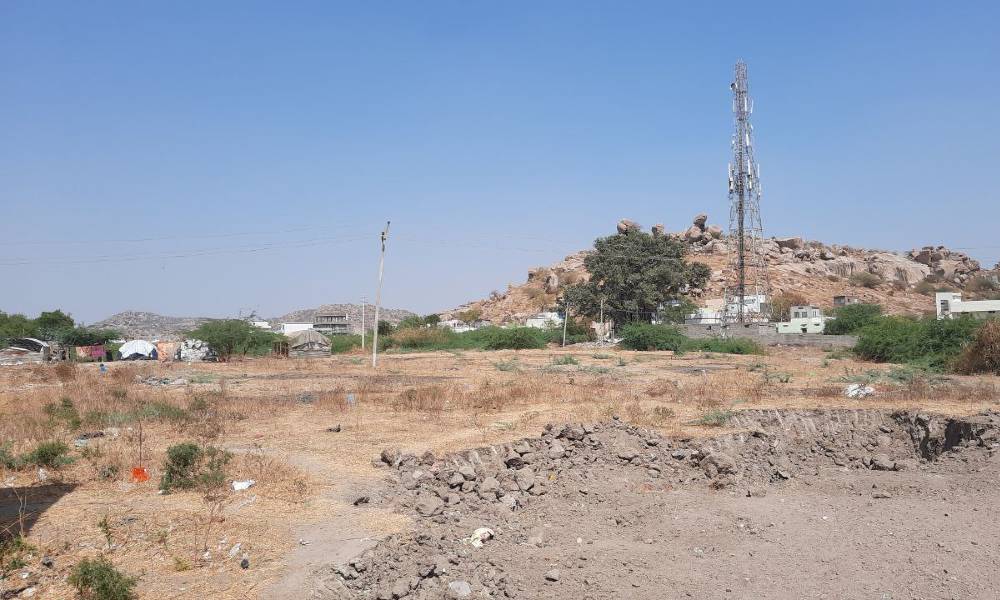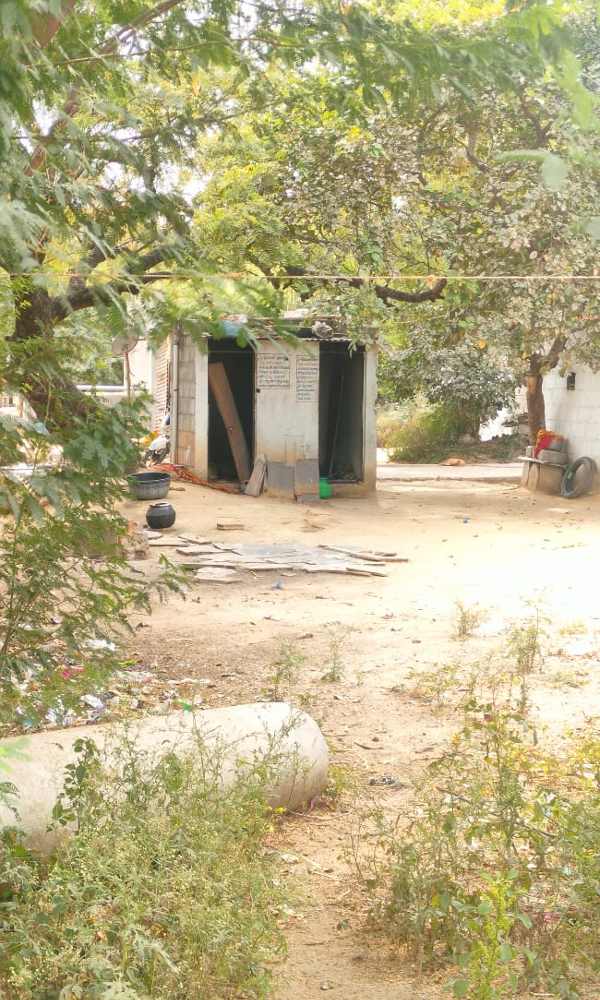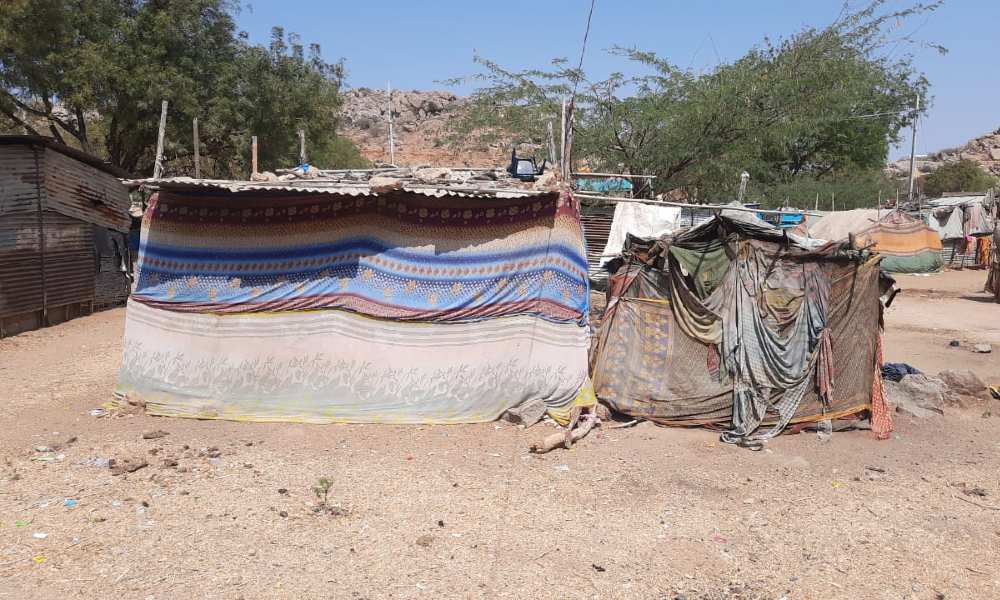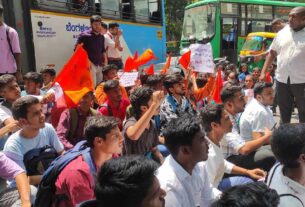In 2019 it was declared that India is Open Defecation Free (ODF).Yet many Indians do not have access to working toilets.
Mahadevi, the head cook at Government Lower Primary School , Malegaddi, pointed at the large field of dry grass and bushes behind the school and said, “This field is our toilet. It is divided into two – half of it is used by men and the other half is for women and children.”
Mahadevi is a resident of Malegaddi, which comes under the Taluk Municipal Corporation (TMC) of Devadurga, Raichur Dist. People like Mahadevi are forced to defecate in the open, as they do not have access to toilets.
“We have been requesting the Municipality for community toilets in our area. But they say that they will build toilets once they grant us housing. I don’t know how long all this will take,” she said. She added that there is a public toilet in the bus stand nearby but they won’t use it as they can’t afford to use Pay and Use toilets.
Kamala, an inhabitant of Yallalinga colony in Devadurga faced asimilar issue. “We don’t have access to toilets or water supply. Even if we get one, how can we use it if there is no water?” she asked.
Both Mahadevi and Kamala said that they are ready to give up open defecation if they have access to toilets with proper water supply.

Rangamma, the anganwadi teacher at Yallalinga colony said, “People here do not have access to proper drinking water or sanitation facilities. Open defecation is also polluting the existing water resources.”She added that diseases like diarrhoea, dysentery and vomiting are common in the area. According to the United Nations Children’s Fund (UNICEF), “Exposed faecal matter contaminates food, water and the environment, and can spread serious diseases, such as cholera.”
Dr. Gangadhar, physician at Taluk General Hospital, Devadurga said that cases of dysentery, gastroenteritis and Hepatitis A are common in the area. He added “Open defecation will definitely contaminate water sources. The pathogens in human excreta will enter human body when people use water contaminated with faecal matter. In rainy season, the contaminated water will be carried away to other water sources, like canals or rivers,increasing the risk of infection. People use this water again. This is a vicious cycle.” He added that proper awareness and access to toilets will help address the issue.
In November, 2023, Devadurga TMC planned to build community toilets in Yallalinga colony under the Swachh Bharat Mission – Urban (SBM-U). However, they dropped the plan due to unavailability of land.
Bhanumathi, Asst. Executive Engineer, SBM Directorate, said, “Unavailability of land and lack of water supply are the major reasons for toilets not being built.”
Swachh Bharat Mission (SBM) was launched in 2014 “to achieve an Open Defecation Free (ODF) India by Oct.2, 2019, as a tribute to Mahatma Gandhi.” It has two components – Swachh Bharat Mission – Urban (SBM-U) and Swachh Bharat Mission – Grameen (SBM-G).
In 2020, SBM-G 2.0 was launched to sustain the ODF status in villages and improve the level of cleanliness in rural areas through solid and liquid waste management, to make villages ODF Plus.An ODF Plus village is one which has sustained its ODF status along with implementing either solid or liquid waste management systems.
In 2021, SBM-U 2.0 was launched with a “focus on sustainability of ODF outcomes, achieving scientific processing of solid waste in all cities and managing wastewater in cities with less than one lakh population in Census 2011.”
In 2019 it was declared that India is Open Defecation Free (ODF). However, the data from National Family Health Survey (NFHS)-5, published in 2021, contradicts the claim of ODF status. According to the data, 70.2 percent of the households had access to improved sanitation facility but this did not mean access to toilet facilities.
Data from the Joint Monitoring Programme (JMP) of the World Health Organization (WHO) and UNICEF shows that five to 25 percent of population in India, practiced open defecation, in 2022.

Under Swachh Bharat Mission -Urban, 34839 community and public toilets (CT and PT) were to be constructed in Karnataka. The target was achieved and 36556 CT and PT were built. In Devadurga TMC, 11 CT and PT were constructed in spite of a target of six.
Open defecation: A Choice
While some people simply do not have a choice, some choose to defecate in the open.
Pavithra, a resident of Rabbankal village in Manvi taluk, said that she uses the toilet built by the panchayat to store things like construction materials and fodder.
Shankar, another resident, said that he has received money from the panchayat to build toilet. “I have collected money to build a toilet. But I haven’t built one. I submitted the image of another existing toilet,” he said. He said that he is not comfortable to use a toilet.
The officials from the gram panchayat said that people are not ready to use toilets and do not maintain existing ones. They think that it is a taboo to use toilets, they are not ready to give up the age-old practice of defecating in the open, an official said. The panchayat conducts programs like rallies to create awareness among people.
Bhanumathi said that open defecation is still persistent in Karnataka. “In several parts of Karnataka, open defecation still persists due to various reasons like lack of access to toilets, lack of water supply, traditional beliefs and taboos,” she said.
She said that the solution is to create awareness among people to bring in a behavioural change. She added to sustain ODF status, there should be proper water supply and maintenance.
Gowthamghosh B, Assistant Professor, Institute of Health Management Research (IIHMR) Bangalore said that unsanitary conditions can increase the risk of diseases like cholera and hepatitis. He added that the challenge is not just building toilets but making people use them. He said that it can only be solved through proper awareness.




